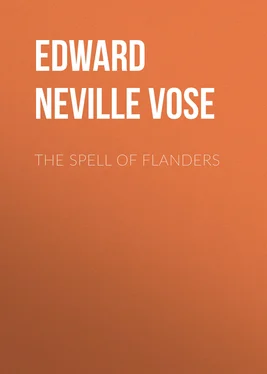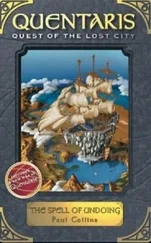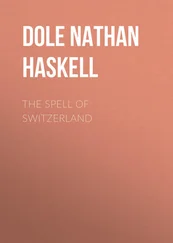Edward Vose - The Spell of Flanders
Здесь есть возможность читать онлайн «Edward Vose - The Spell of Flanders» — ознакомительный отрывок электронной книги совершенно бесплатно, а после прочтения отрывка купить полную версию. В некоторых случаях можно слушать аудио, скачать через торрент в формате fb2 и присутствует краткое содержание. Жанр: Путешествия и география, foreign_antique, foreign_prose, на английском языке. Описание произведения, (предисловие) а так же отзывы посетителей доступны на портале библиотеки ЛибКат.
- Название:The Spell of Flanders
- Автор:
- Жанр:
- Год:неизвестен
- ISBN:нет данных
- Рейтинг книги:5 / 5. Голосов: 1
-
Избранное:Добавить в избранное
- Отзывы:
-
Ваша оценка:
- 100
- 1
- 2
- 3
- 4
- 5
The Spell of Flanders: краткое содержание, описание и аннотация
Предлагаем к чтению аннотацию, описание, краткое содержание или предисловие (зависит от того, что написал сам автор книги «The Spell of Flanders»). Если вы не нашли необходимую информацию о книге — напишите в комментариях, мы постараемся отыскать её.
The Spell of Flanders — читать онлайн ознакомительный отрывок
Ниже представлен текст книги, разбитый по страницам. Система сохранения места последней прочитанной страницы, позволяет с удобством читать онлайн бесплатно книгу «The Spell of Flanders», без необходимости каждый раз заново искать на чём Вы остановились. Поставьте закладку, и сможете в любой момент перейти на страницу, на которой закончили чтение.
Интервал:
Закладка:
This plan was unanimously voted to be a capital one—in theory, at any rate—and thus it was that in our subsequent wanderings about Flanders, under the guidance of the indefatigable Professor, we often crossed our trail, and now and then visited the same place more than once. In practice it did not accomplish quite all that was expected of it by its learned originator—but what plan ever does, or ever will? That it enhanced the interest of the trip manyfold we all agreed; it often sustained our flagging zeal, and it helped us to know Flanders—the Flanders of the past especially—far better than we would have done in any other way.
CHAPTER II
VIEUX BRUGES AND COUNT BALDWIN OF THE IRON ARM
Itis not the purpose of this veracious chronicle to recount the doings and sayings, the incidents or lack of incident, on the voyage across. Suffice it to say that in due season the good ship Lapland turned its prow away from the white cliffs of Dover and straight toward the low-lying shores of Flanders. As she crossed the North Sea scores of fishing boats with brown sails hovered around her, while throngs of seagulls soared overhead, or now and then dashed madly into her foaming wake to grasp some morsel flung from deck or porthole, or fight fiercely with each other for its possession. Presently, in the haze ahead, a faint outline of land could be distinguished, and soon we could see through our glasses the heaped up dunes that mark the battle line between the North Sea and the fertile Flemish polders behind them. Here and there the shore was strengthened by rows of pilings to keep the waves of Winter from washing it away. As a “sight,” however, it was dreary and uninviting enough—not at all like the picturesque headlands of Merrie England we had been looking at only a few hours before.
Now, for a time, the ship kept its course parallel to the shore, but at a distance of a mile or more. Gradually the coast became more inhabited, and soon we could see a row of stone and brick buildings facing directly on the beach which some one said was Blankenberghe. No doubt there were other rows of houses behind the first, but either they were lower, or in the haze our glasses could not distinguish them. Then the panorama of the Flemish coast unrolled a little further and we saw the long curved breakwater of Zee-Brugge, with its white lighthouse. This is an artificial port connected with the ancient capital of Flanders by a ship canal. Entrance to the canal from the sea is effected by a large lock which was faintly visible. Another beach city, Heyst, next appeared—the ship seeming to stand still while the shoreline marched slowly past. Then came a smaller place, which from our maps we concluded must be Knocke. Here the coastline of the present Kingdom of Belgium ends, the little River Zwyn—once famous as the channel up which one hundred and fifty ships a day made their way to Bruges in the days of its greatness—forming the boundary.
The Dutch are apparently not interested in sea bathing, for there were no more watering places. In fact the whole coast seemed to be dead and deserted, and we were glad when the Lapland began to turn her prow inland. We were now in the broad estuary of the Scheldt, and soon the tiny city of Flushing appeared. It was over on the other side of the ship and we all scampered across to take our first “near look,” as Mrs. Professor expressed it, of the land we had come to see—for Flushing belonged for centuries to the great overlords of Flanders, the Dukes of Burgundy and their successors. It looked very small and compact from the towering deck of the big liner, but also very quaint and interesting, and we all agreed that as a sample of what we had come so far to see it was the reverse of disappointing.
Soon the propellers of the Lapland began to revolve again and the little Dutch city slowly slipped out of sight in the fast gathering gloom of a coming shower. As night came on the engines presently came to rest once more and we anchored to await daylight and flood tide which, the officers said, would come together. At four o’clock the following morning the Professor and I were on deck in order to miss as little as possible of the voyage up the “greyest of grey rivers,” as the Scheldt has been called. The Lapland had started while we were asleep, and we were already in Belgium. This circumstance disappointed the Professor not a little as he had set his heart on seeing the remains of the Dutch forts at the boundary line that for nearly one hundred and fifty years—from the Treaty of Munster in 1648 to the French occupation in 1794—closed the river to ocean commerce. Meanwhile, grass grew in the streets of the all but deserted city of Antwerp. The French tore down the hated forts and for nearly forty years the ships from oversea went up the river unmolested. Then came the Revolution of 1830 and the establishment of the Kingdom of Belgium, whereupon the Dutch proceeded to impose heavy navigation duties upon all ships passing through the lower part of the river. While this did not stifle the trade of Antwerp, it seriously crippled it, since the duties formed a handicap in the keen competition for traffic between the Belgian port and those of Holland and Germany farther to the eastward. It was not until 1863 that the Belgian Government was able to arrange a treaty whereby all river dues were abolished in return for the payment of a lump sum of 36,000,000 francs—of which only one-third was paid by Belgium, as other powers were interested in obtaining freedom of navigation on this important river and gladly contributed the remainder. The imposing monument by Winders on the Place Marnix at Antwerp, which was erected in 1883, commemorates this important event, to which the port owes its present prosperity.
As the Lapland slowly steamed up the river we could look down from her lofty decks upon the broad and intensely cultivated plain, stretching as far as eye could penetrate in the misty distance. Here and there we could see compact little groups of farm buildings, usually arranged around a central courtyard and with their outer walls well-nigh windowless, as if the peasant proprietors still counted on the possibility of a siege such as their ancestors no doubt often had to sustain against the wandering marauders and freebooters who for centuries infested the country. Along every road and canal, and beside nearly every cross-country path, we could see long lines of trees set out at regular intervals and cutting the landscape into sections of varying sizes and shapes. Now and then a little hamlet could be seen, with its red-tiled roofs nestling close together and a tiny church steeple rising from the centre. Often the roofs of the houses nearest to the river were below the top of the high dykes which here enclose the Scheldt on either side. Close to the banks an occasional fort commanded the river—outlying links in the great chain of fortifications that was thought to be impregnable until the huge German siege guns so quickly battered it to pieces.
Presently some one with a keener vision than the rest cries that the spire of the Cathedral of Antwerp is in sight and we all crowd forward and peer eagerly through the mist until at last we make out vaguely the shape of that marvel of Flemish architecture rising above the flat plain. At each turn of the river it draws nearer and we can see more clearly its delicate tracery of lace-work carved in stone, while one by one other spires loom up through the grey dawn.
The traffic in the river becomes more dense as we proceed slowly onward—huge red-bottomed tramp steamers with their propellers half out of the water and churning furiously in a smother of foam, clumsy canal boats with Flemish or German names lying at anchor close to the banks, barges with dingy brownish sails and all manner of strange cargoes. Then, suddenly, we swing around the last turn and the entire city lies before us, its houses with their high peaks and dormer windows rising tier above tier, while at the left we catch glimpses through the lock gates of the vast inner docks with their hundreds of masts and funnels. Curiously enough the view to the right is entirely different—the green fields and farmsteads stretching in this direction from the very edge of the river as far as the eye can see.
Читать дальшеИнтервал:
Закладка:
Похожие книги на «The Spell of Flanders»
Представляем Вашему вниманию похожие книги на «The Spell of Flanders» списком для выбора. Мы отобрали схожую по названию и смыслу литературу в надежде предоставить читателям больше вариантов отыскать новые, интересные, ещё непрочитанные произведения.
Обсуждение, отзывы о книге «The Spell of Flanders» и просто собственные мнения читателей. Оставьте ваши комментарии, напишите, что Вы думаете о произведении, его смысле или главных героях. Укажите что конкретно понравилось, а что нет, и почему Вы так считаете.












